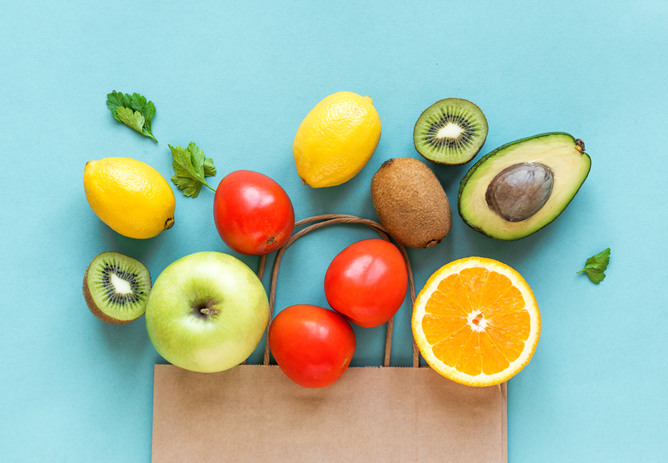10 January 2024
Saving on Food During Inflation
Food shopping is a necessary evil for many of us today, with some even being pushed to make the choice between eating and heating at the moment. With poverty and malnutrition having become a public health issue, 9 million adults in the UK, 17% of households, experienced moderate or severe food insecurity in 2023 (a massive rise from 7.3% in June 2021!) But it needn’t be a black hole, and there are a few things you can do to help!
Please note, if you’re struggling to find ways to pay for food, even after using these tips, there are places you can go to get help! You can either refer yourself or a family/friend member to a food bank to help you! There is no shame in this, and many are now turning to places such as food banks in order to eat. Stay safe, and don’t suffer in silence!
Save by Reducing & Reusing
Whenever you go out shopping in general, for anything, try and keep in mind the well-known saying: reduce, reuse, recycle. Convert this saying into these three phrases: Do I really need it? Do I already own it? Do I have access to something I can use instead? This will go a long way to help you cut down to what you really need, which is vital for saving money! With this mind, consider the following too!
Reduce the Purchase of Processed & Pre-Packaged Foods
Contrary to popular belief, and when you sit down and do the maths, processed and pre-packaged foods are more expensive on average than buying the ingredients outright. To prove it, we’re going to have to pick on Lidl, one of the leading budget supermarkets in the UK.
This has been done on the assumption that you’re feeding a family of four and have decided that tea tonight is a classic: Spaghetti Bolognese! (But if you live alone, you can freeze the rest as tea for the rest of the week, so take notes regardless!)
At Lidl, their ready-made Spaghetti Bolognese comes out at £2.49 per portion, which would mean times four: £9.96 for the meal!
But what if you were to purchase those ingredients separately?
500g of beef mince at Lidl comes out at £3.49, 500g of Spaghetti comes out at 75p and, if you don’t want to make the sauce yourself, Bolognese Sauce comes out at 79p. Altogether, that comes to £5.03 – divided between four people that is £1.26 per portion.
That’s £1.23 cheaper per person than if you were to simply buy it pre-made and pre-packaged! Not only that, but it’s likely healthier too! If you’re feeling fancy, you can actually splurge the difference on some garlic bread to go with it!
So next time you’re gazing at the ready meals, why not try this experiment? You’ll likely find the same can be applied, time and again.
Buy Wholefoods in their Natural State
With the above in mind, it is cheaper overall to buy wholefoods in their natural states. This includes fruit, veg, meat and dairy. Avoid buying pre-packaged fruit and veg, buying it by weight not only allows you more control over how much you buy, meaning you waste less, but it’s generally cheaper to do so too!
Of course, you will need to cook it yourself, but cooking doesn’t need to be a chore, and it’s a skill that if you develop, you’ll find easier to save with. It’s also not something that needs to take hours of your time. Choose recipes that are quick, cheap, and easy to do and, if you have a family or kids, why not get them involved too? You can begin teaching a lifelong and important skill to your kids and turn cooking into a family activity. Just watch out for hot and sharp objects and always ensure you supervise your children when they help you cook!
Always go Permanent over Disposable
Minimise the use of paper towels in the kitchen and disposable plates, cups, or roasting trays. Any item that involves being thrown away or cannot be reused in some way, avoid. Use cloths for the kitchen that can be washed instead of buying kitchen rolls or disposable sponges, buy your own roasting trays and use them instead. Need cleaning equipment? Bicarbonate of soda, lemon and vinegar go a long way instead of stocking up on dozens of expensive cleaning solutions! Remember, permanent over disposable!
Don’t forget the shopping bags!
At their cheapest, plastic shopping bags are now 10p a bag. If you’re doing a big shop, that can mount up quickly every week! When you already have quite the collection at home, that seems like a waste of money to us!
If you’re someone who’s in the habit of forgetting, keep them in the boot of your car if you have one, or somewhere near the front door so that they’re at the forefront of your mind before you head out.
Tips for Keeping Expenses Down
Use a list and stick to it!
The easiest way to do this is to organise your list by store layout if you can. For example, ensure all your dairy is listed together, your fruit and veg, meat, and so on. This will ensure you’re more organised, and not left wandering around the shop looking for the items you need and, as a consequence, walk into those nasty impulse purchases.
In fact, stick to the healthier aisles altogether if you can, not only will it be better for your wellbeing, but it will be better for your wallet too!
Finally, when making your list, ensure you go through your cupboard and fridge for items you need – you don’t want to buy what you already have!
Don’t shop when you’re hungry!
Wandering around the supermarket as your stomach rumbles loudly is not a good idea, as it opens you up to impulse purchases. Also, when we’re hungry, we’re far more likely to crave those pre-packaged, processed foods we can eat quickly and easily. Try shopping after mealtimes instead!
Buy food when it goes out of season, or out of date.
Much like other retail outlets, supermarkets will typically sell off seasonal food! Think Christmas, Easter, and Halloween. Christmas Eve and Boxing Day are normally great times to stock up on Christmas meats for example – why not buy them reduced and freeze them?
The same also applies to food about to go out of date. Why not make it a habit to head there first when you begin your shop? The best times to head over are about midday on a Sunday, or later on in the evening during the week! Look for food that can be frozen, or is best before, and you may find yourself saving a lot of time and money in the long run!
Shop at Discount Supermarkets
Supermarkets like Aldi and Lidl are your best bet when to comes to saving money on your groceries, but of course, it doesn’t hurt to shop around all the same for deals. We don’t recommend buying your toiletries from the supermarket, as often they’re expensive. Try heading to stores such as Savers instead to buy your toiletries, or even Poundland! You can also head to other places such as Home Bargains and B&M too for more general items such as pet food, cleaning products and toiletries!
Buy Store Brands and in Bulk
It’s actually surprising how little difference there is between some of them and, if you put aside your biases, how you likely wouldn’t be able to tell the difference either! Sometimes, the cheaper option is even preferred by consumers!
Here are some other quick-fire findings from Which?
Aldi Specially Selected Ultimate Burger came out top of its class despite its £2.89 for two burgers price being well below the £4.75 of Gourmet Burger Kitchen.
Lidl’s Deluxe Pork Sausages – at £2.49 for 400g – beat the Heck brand equivalent in both taste and price, with the latter costing £3.09 for 400g.
Sainsbury’s Cream of Tomato Soup scored 10 per cent better among taste testers but at 57p per 400g tin, was £1.13 less than the Heinz variety.
Jamie Oliver Tomato & Chilli Pasta Sauce was nice enough, but reviewers preferred the Tesco Tomato & Chilli Pasta Sauce, which costs only 85p per 500g jar, compared with £2.75 for 400g.
If you’re looking to replace items yourself, we’ve found your best luck lies with some of the generic versions of the following:
- Tomato sauce and paste
- Canned and frozen veg.
- Canned soup
- Biscuits and crackers
- Dairy products (such as milk, butter, cheese, and eggs)
- Coffee and tea
- Bread, roll and buns
- Pasta, rice, and noodles
Finding space?
Don’t have a pantry for your bulk buys? Try using a spare cupboard or wardrobe, or utility room, wherever there’s a small space for a stack of cans or big bag of pasta. Not everything has to live in the kitchen, even under the bed or in the garage is fine! Just don’t forget where you put them!
The best foods to bulk buy are:
- Tea and coffee
- Pasta and rice
- Pet food
- Long life milk (UHT)
- Canned items
- Dried fruit and nuts
- Softs grains and legumes (such as oats, lentils, and quinoa)
Seeing Through the Gimmicks!
The old switcheroo!
Supermarkets will often switch aisles and items around to entice you into new ones, don’t fall for it! This is why shopping by department, and organising what you need into those departments in your list, works. It will stop you from having to wander around looking for where your items went.
Filtering through the bad!
Produce, bread, dairy and meat are usually kept to the edges, so customers have to walk past all of the offers and goodies to get to them. Rather than heading into the middle of the supermarket when you shop, stick to the edges to avoid the impulse buys.
Don’t shop at eye level!
Often the cheaper products are on the bottom and top of the shelves, so when searching for good deals and cheaper alternatives, take a look in those areas!
Remember, if you need help buying food during the cost-of-living crisis and these tips just aren’t cutting it, there is help out there! You don’t need to go without food, and you don’t need to make a decision between eating and staying warm this winter!






